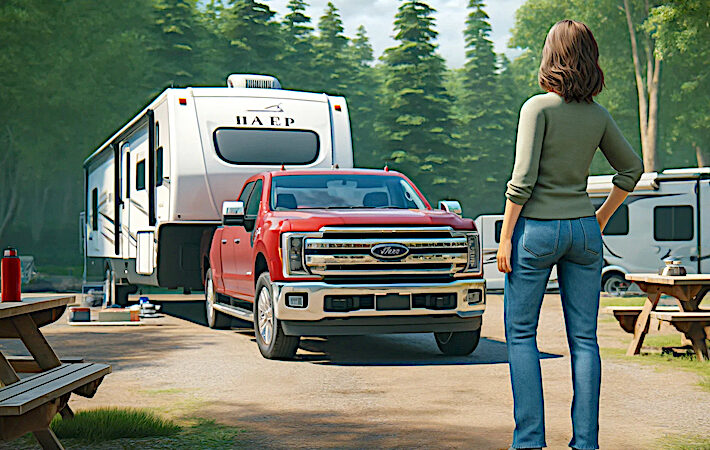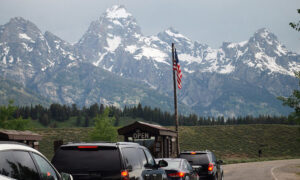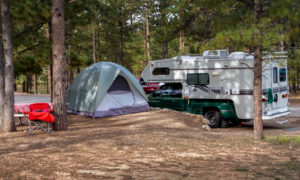
These RV tips for beginners plus proper preparation will help make your RVing experience enjoyable and memorable. The tips here are meant to be a basic introduction to the fundamental knowledge you need to start off on the right foot.
Essential Equipment for RV beginners
Here is a list of essential RV equipment items along with a one-sentence explanation for each:
- Basics Tool Kit: Having essential tools on hand can save time and money by allowing quick fixes without needing professional assistance.
- Spare Washers for Water Hose: Keep rubber washers on hand to replace plastic or missing ones and prevent leaks.
- RV Sewer Hose (Minimum 20’): Ensure you have at two ten-foot sewer hoses with proper connectors to handle different campground setups.
- Sewer Connection Elbow or Rubber Doughnut: Use proper septic connectors to avoid odors and comply with campground regulations.
- Leveling Equipment: Have tools or devices to level your RV if the campground site is not level.
- Level: Carry a small level to ensure your RV is properly balanced.
- Wheel Chocks: Use heavy-duty chocks to prevent your RV from rolling, especially on steep sites.
- Spare Tire for RV, Jack, and Tire Iron: Be prepared for flat tires.
- 4-Way Lug Nut Wrench: An inexpensive and reliable tool to fit almost any lug nuts. A socket and long breaker bar will work, bit I prefer the 4-way.
- Tire Pressure Gauge: Maintain proper tire pressure to prevent blowouts and extend tire life.
- Spare Electrical Fuses: Have the correct type of fuses on hand to avoid robbing from non-critical circuits.
- Spare Light Bulbs for Main Lights: Carry spare bulbs to avoid being left in the dark and comply with safety regulations.
- Fire Extinguisher: Ensure safety with at least one fire extinguisher, ideally one at each end of a larger RV.
- Power Cord Extension/Power Adapters: Have adapters and at least a 25-foot extension cord to connect to various power hook-ups.
- Potable Water Hose (Minimum 50’): Use a dedicated white hose for drinking water and have multiple lengths to reach most water faucets.
Why you should have a basic tool kit.
Learn to Drive and Handle Your RV
Driving an RV is different from driving a car. Take the time to practice driving in various conditions. Start in a large, empty parking lot to get a feel for the size and handling of your RV. Practice turning, reversing, and parking. Once you’re comfortable, take your RV out on the road to experience different driving conditions.
Understand the height and weight restrictions of your RV to avoid low bridges and weight-limited roads. Consider taking a driving course specifically for RVs to build your confidence.
Plan Your Route and Stops
A little planning contributes to a successful RV trip. Map out your route, including stops for fuel, food, and overnight stays. Use RV-friendly apps to find campgrounds, rest areas, and service stations. Check for road conditions and weather updates. Having a well-thought-out plan helps you avoid last-minute hassles and ensures you have a place to park and rest each night. Don’t forget to factor in time for sightseeing and exploring local attractions along the way.
The 3/3/3 Rule for RV Trips:
- One of my top tips for RV beginners is to follow the 3/3/3 rule. It makes RV trips less tiring and more enjoyable.
- Drive no more than 300 miles per day (about 6 hours).
- Arrive at your destination by 3 p.m. for better campsite selection and setup time. At least arrive before Sundown.
- Take a break every 3 hours. Driving an RV is different from driving a car. You don’t have to wait 3 hours to stop, but it’s important to get off the road for a few minutes to relieve stress and get refreshed.
Benefits:
- Prevents road fatigue and promotes safer driving.
- Allows more time for fun and sightseeing.
- Reduces stress by arriving before dark.
- Enhances overall enjoyment of the trip.
Additional tips:
- Take breaks every 3 hours.
- Adjust distances as needed.
- Setting up after dark is challenging.
Understand Your RV’s Systems
Familiarize yourself with your RV’s systems, including water, electrical, and waste management. Learn how to connect to shore power and use your RV’s battery system. Regularly check and maintain these systems to prevent issues during your trip.
I can’t over emphasize the importance of understanding your slide-out system and knowing how to operate the slides manually. The only thing worse than arriving at you campsite and your slide-out won’t extend is when you’re redy to leave and they won’t retract. Practice manually opreating them at home, before your next trip.
Set a maintenance schedule for your RV. This includes regular checks of the roof, seals, and tires, as well as servicing the engine and generator.
Pack Wisely
Space in an RV is limited, so pack efficiently. Bring only what you need and prioritize multipurpose items. Ensure you have essential tools and supplies, such as a first-aid kit, flashlight, basic tools, and spare fuses. Don’t forget personal items like toiletries, clothing, and bedding. Keep your RV’s weight within its limits to ensure safe driving. Consider investing in space-saving solutions like collapsible kitchenware, stackable storage bins, and vacuum-sealed bags for clothing.
Stay Safe on the Road
Safety should always be a priority. Secure all items inside the RV before driving to prevent them from shifting. Be mindful of your speed and the impact of wind and weather conditions on your driving. Regularly inspect your RV’s tires, brakes, and lights to ensure they are in good working order. Know the weight distribution of your RV and ensure it is balanced to avoid handling issues. Carry an emergency kit that includes road flares, a jack, and spare tire, as well as emergency contact numbers.
Set Up Camp Efficiently
When you arrive at a campsite, take your time to set up properly. Level your RV using leveling blocks or built-in leveling systems. Connect to the campground’s power, water, and sewer hookups. Set up your outdoor area with chairs, tables, and any other items you’ve brought for comfort. Make sure you follow campground rules and respect your neighbors. Take note of the campground layout, including the location of amenities like restrooms, laundry facilities, and recreational areas. Learn about selecting an RV park or campground.
Enjoy the Experience
This is another one my top tips for RV beginners. New RVers too often focus on the destination. RVing is supposed to enjoyable. The journey should be as much fun and interesting as the destination. Take time to explore new places, meet fellow RVers, and experience the freedom and adventure that RVing offers.
Don’t stress over small issues—every trip is a learning experience. Keep a positive attitude and embrace the adventure. Document your travels with photos and a journal to capture memories and to share your experiences with family and friends.
Keep Learning RV Tips for Beginners
RVing is a continuous learning process. The more you learn, the more confident you’ll become in your RVing skills.
Learn more tips for a first time-rvers.
Stay informed by joining our RVing Tips Facebook Group. And if you found this article helpful, consider getting a copy of my book, Best RV Tips from RVTipOfTheDay.com. I cover these topics and many more in much greater detail.







